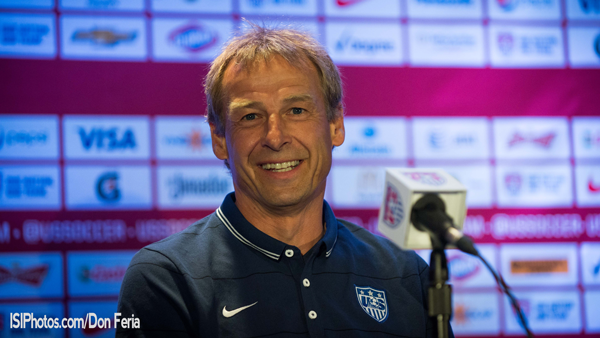Jurgen Klinsmann: Should he stay or should he go now?

When the wave of disappointment of the United States Men’s National Team’s exit before the quarterfinals dissipates, there will be questions left to answer. Did the U.S. do all it could to advance as far as it could in the World Cup, were the coaching decisions prior and during the tournament correct and ultimately was there progress?
Those questions need to be turned towards Jurgen Klinsmann. While Klinsmann is already inked by the United States Soccer Federation for the 2018 World Cup cycle, does he still deserve to come back as head coach?
The sunny disposition, American transplant via Germany is charismatic, brought a strong playing and strong national coaching pedigree – his time at Bayern Munich lasted only a year amid clashes with club hierarchy – and lofty promises.
[ +READ: USMNT show same courage, same heart, same defects in World Cup defeat]
One of those was to bring a proactive possession-based style to the national team, which would have differed from the typical gritty, defensive counter attacking play that has been seen on a consistent basis. However, after four games on the biggest stage, the possession game still hasn’t been found. The 2014 World Cup was played out very similar to the past.
Other than the opening minutes against Ghana, the majority of the Portugal match and after going behind against Belgium, the U.S. allowed their opponents to dictate tempo while the USMNT looked to keep the levee from breaking and get goals in true smash and grab fashion. The U.S. finished with just the one win in the opener against Ghana.
Whether Klinsmann realized the team couldn’t play that way, possibly because of Jozy Altidore‘s injury, the reason for the more defensive tactic is something only the U.S. head coach and technical director could answer. Instead of the proactive, the U.S. remained a reactionary side, continuing with the underdog spirit, but comes off as a slight shame as the USMNT was capable of causing problems going forward, but only showed those capabilities when their backs were against the wall.
[ +READ: LeBolt – Open letter to Ann Coulter]
Not only did the U.S. not bring the more fluid playing style to Brazil, some of the players that didn’t go can also be questioned. Landon Donovan is the obvious choice to point to. Perhaps he should have been on the bench, especially when the U.S. ran into situations that called for a player of his quality.
Not to beat the dead horse too much, but does Klinsmann hesitate as much as he does in the Round of 16 match against Belgium if Donovan is there ready to be called on? Julian Green did come on and make an impact, but it was a little too late as the USMNT found themselves down by two goals.
The final cut that may have been the biggest mistake was not taking Terrence Boyd. If a game plan hinges so much on Altidore’s physical hold up play then to not have a back up in case of injury, which did happen, was a huge mistake. Clint Dempsey fought admirably up top, isolated often, but that isn’t his game. Also, Chris Wondolowski‘s inclusion over the now RB Leipzig striker raises even more eyebrows with the miss from close-range against the Belgians.
Another area that Klinsmann may have taken missteps was in the fitness regimen leading up to the World Cup. Three players came up with lame hamstrings with Altidore being kept out for the remainder of the World Cup, Fabian Johnson leaving in the final match against Belgium and Matt Besler leaving at the half against Ghana, but able to continue the rest of the way. While Klinsmann pointed to the U.S. players not used to playing at such an intense level, thus the intense training camp, it sounds more like him sidestepping his responsibility in the matter. While having fit players is essential, especially when games can run for 120 minutes, running them into the ground to the point of breaking before the event is ill-advised.
[ +READ: Kaka heads to Orlando City for the project, not the money]
However, there are not all negatives to take away from what was an exciting run, despite the heartbreaking end. Klinsmann’s game management and substitutions were almost always spot on. DeAndre Yedlin looked fantastic when called upon, Green scored a goal with his first World Cup touch and John Brooks scored a game-winning goal. Klinsmann was also able to get the best out of Kyle Beckerman for three games as his inclusion looked an absolute master stroke from Klinsmann. While many didn’t feel Jermaine Jones should have been involved, his stature ultimately grew the most at the World Cup – other than the amazing goalkeeping of Tim Howard.
Klinsmann can also be thanked for bringing in several dual-nationals with some inclusions still more warranted than others. Timmy Chandler and Mix Diskerud, who played well in the Send-Off Series matches, were forgotten men as both never saw the field. Aron Johannsson didn’t seem to have full faith of Klinsmann as he was used sparingly when the U.S. was chasing games.
However, these players’ choice to represent the U.S. was certainly aided by Klinsmann’s reputation in the game. While throwing some of the youth at the deep end appeared fruitful for some and not so much for others, the U.S. has a much stronger, younger base to choose from in the future. Not to mention a player like Yedlin blossoming in the world’s premier tournament was a fantastic sight to see. The USMNT will have a fun, competitive battle to watch between Johnson and Yedlin for the right back position or they could be used in a back and midfield tandem, which would frighten any opponent on sheer pace.
Another reason Klinsmann should remain in his post was his ability to mesh the squad together and the belief the players had in him – even if at times he didn’t believe or seemingly didn’t believe in them. Every player that touched the pitch gave their all for their head coach and the U.S. crest. Also, a coach that has won a World Cup and finished in third as a coach in another, instantly commands respect in the locker room.
In the end, Klinsmann still crashed out of the World Cup at the same stage Bob Bradley did, who was fired soon after. However, Klinsmann shouldn’t suffer that same fate. There was some progress in qualifying out of the “Group of Death” – a group that U.S. may not have survived in the past. Also, the transition with so many young players already blooded into the squad is a major plus moving forward.
While there were several positives from the Cup run – on the field as well as off the field with major television ratings – the negatives should put Klinsmann on a much shorter leash.
If the U.S. is still repeating the past in major tournaments in about two years time, than it could very well be time for a change.











